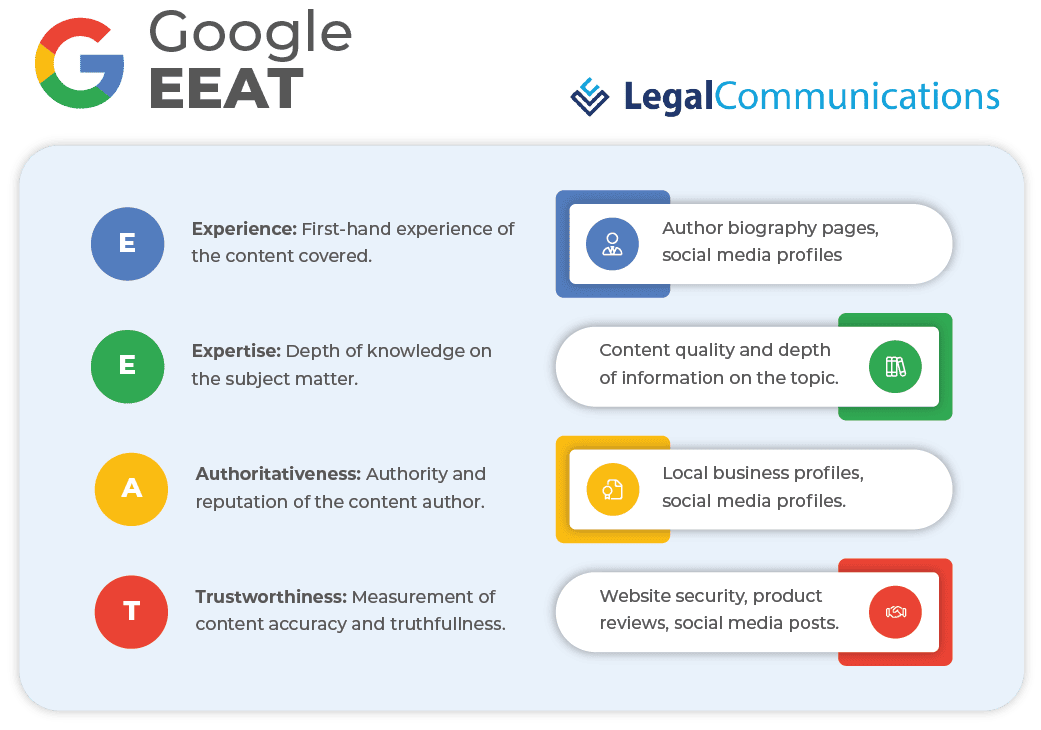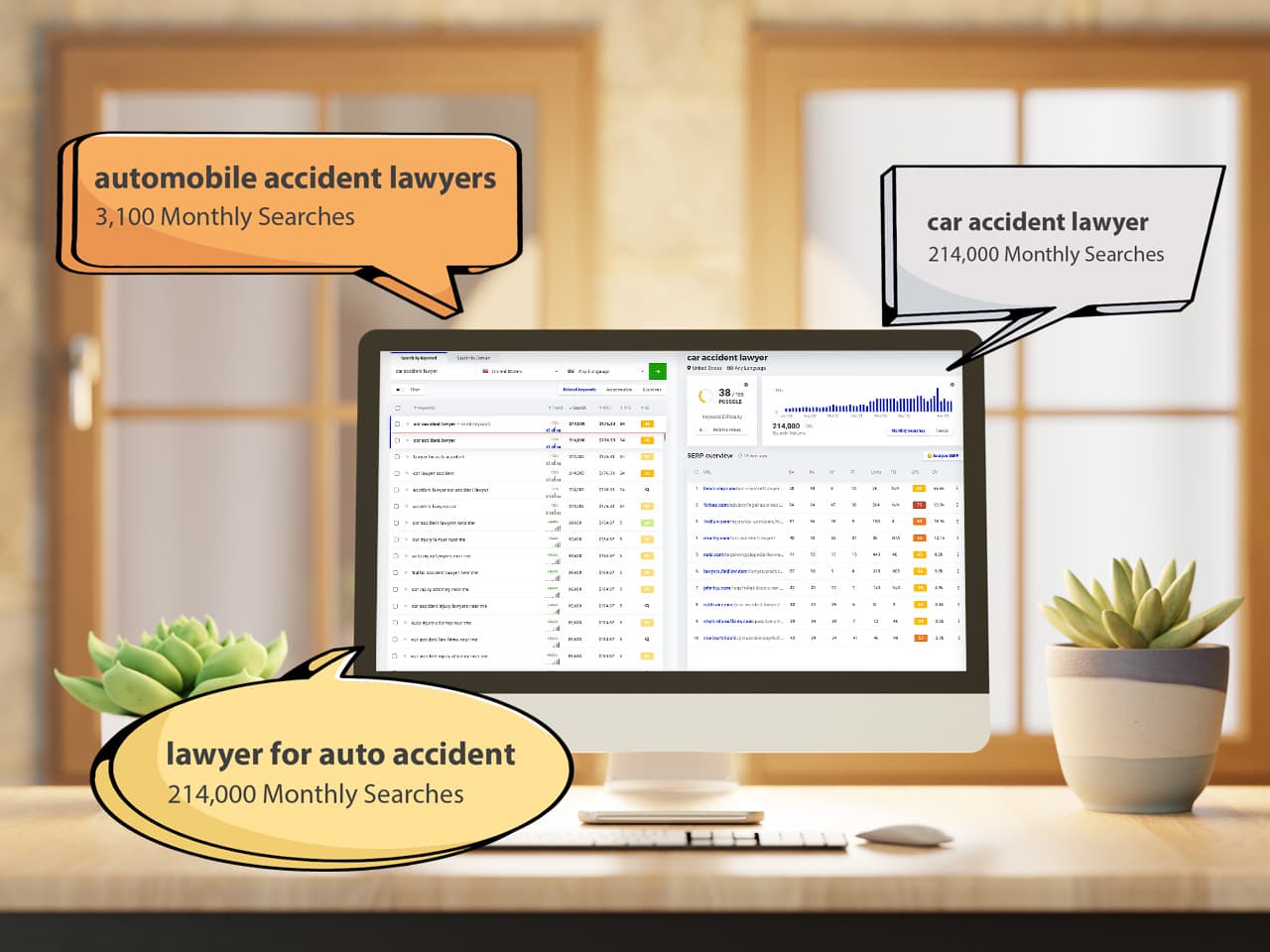Law firms fight for online visibility in an intensely competitive legal market, and what you don’t know can be your digital marketing downfall. This especially applies to search engine optimization (SEO). Unfortunately, SEO strategy is not a one-and-done solution; it requires constant revisiting, learning, adapting, and optimizing.
With Google's constant algorithm updates, understanding and implementing their ever-changing guidelines is crucial for achieving sustainable SEO success. Among these guidelines, EEAT—Expertise, Experience, Authoritativeness, and Trustworthiness—stands out as a critical aspect for law firms to grasp. So, what does EEAT entail, why is it vital for law firm SEO, and how can your firm’s online presence effectively meet EEAT criteria? Keep reading to learn more.
What is YMYL?
YMYL stands for “Your Money Your Life,” and goes hand-in-hand with Google’s EEAT guidelines. According to Google, YMYL content is “pages and topics that could potentially impact a person’s future happiness, health, financial stability, or safety.” Examples include:
- News and Current Events
- Civics, Government, and Law
- Finance
- Shopping
- Health and Safety
- Groups of People
These websites are subjected to greater scrutiny and higher standards because they can have real-world consequences on a user. In addition, higher EEAT scores may be required for some topics versus others.
What is EEAT?
EEAT is made up of four key components:
- Experience: Content should reflect firsthand or life experience on the topic.
- Expertise: Authors should demonstrate sufficient knowledge or skill through multiple articles on the subject.
- Authoritativeness: Websites should be recognized as go-to sources, supported by regular citations from peers.
- Trust: This crucial element is measured by combining the previous three values, along with about-page information, client reviews, and positive reputation indicators.
Although EEAT itself isn't a direct ranking factor, according to Google, it significantly influences the assessment of Page Quality (PQ), particularly for YMYL topics that impact health, finance, safety, and societal welfare.

Factors That Impact EEAT Criteria
Now that we’ve examined what goes into a successful SEO strategy for YMYL industries, you may wonder what to look out for when building a strong digital presence loved by Google.
Google ranks content based on the following factors:
- Page purpose. Is this page meant to deceive the user?
- Potential for harm. Is this page or website harmful to people or society?
- Topic of page. Does YMYL apply to this page? If so, higher standards will apply.
- Type of website. PQ varies among different kinds of websites. For example, hobby websites have PQ standards different from those of corporations or e-commerce websites.
- Available information. Are there bio or About Us pages?
- Quality of MC (main content): How was the content designed? Is it original and accurate?
- Talent or skill of the content creator. Does the MC showcase the talent of a creator, such as a professional writer in a blog, a dancer on a platform like TikTok, or a how-to YouTube video from a skilled plumber?
- Page title. Does the title properly reflect the content on the page?
- Are ads intrusive or hinder the user’s ability to navigate the page?
- Reputation of website and content author. Reviews and About pages directly speak to a page or website’s credibility.
- With misinformation rampant in today’s digital landscape, trustworthiness is especially emphasized in EEAT guidelines to ensure users access accurate, correct information in YMYL sectors.
Why Does EEAT Matter for Your Law Firm?
Google's quality raters pay close attention to EEAT signals, especially for YMYL topics like law. Failure to establish appropriate EEAT may lead Google to perceive your website as untrustworthy, potentially resulting in low PQ ratings. This can adversely affect your firm's online visibility and reputation.
Tips on Meeting EEAT Criteria for Your Law Firm
To enhance your law firm's EEAT signals and improve SEO performance, consider implementing the following strategies:
- Comprehensive attorney pages showcasing education, bar admissions, practice areas, associations, and awards
- Accurate office pages with consistent NAP (Name, Address, Phone) information matching Google Business Listings
- Integration of social media profiles, particularly LinkedIn, on attorney pages
- Author blocks should be included on critical YMYL pages to establish credibility
- Detailed "About the Law Firm" and "Contact" pages to provide transparency and accessibility
- Establishing topical authority across practice areas by covering all relevant aspects thoroughly
- Actively collecting and showcasing client reviews to bolster trustworthiness
- Ensuring the presence of terms and conditions pages to enhance transparency
- Implementation of SSL certificates for enhanced website security
- Regular updates to old or outdated content to maintain relevance and accuracy
Example of Low-Quality Page Rating
The homepage of the Flat Earth Society, a group of people united by the belief that the earth is flat, is a prime example of a website with one of the lowest quality ratings. This rating is primarily due to harmfully misleading information that is guilty of the following:
- Contains unsubstantiated theories and claims not grounded in facts or evidence
- Contains inaccurate information that straightforward and widely accepted facts can refute
- Contains information that contradicts the well-established expert consensus
No offense, flat earthers. It’s Google’s words, not ours.

Legal Marketers Combining Intuitive Talent and Applied Skill
By aligning with Google's EEAT guidelines, law firms can confidently navigate the digital terrain, ensuring their online presence reflects the quality and trustworthiness expected by users and search engines alike.
Understanding and implementing EEAT guidelines are essential for achieving sustainable SEO success in the crowded law firm marketing industry. By prioritizing expertise, experience, authoritativeness, and trustworthiness, law firms can enhance their online visibility and establish themselves as credible sources in their respective markets. To learn more about how Legal Communications can help optimize your law firm's SEO strategies, visit our Law Firm SEO Services page or contact us to learn more.
Contact us by submitting a form online or calling us at 215-364-8828 to get the conversation started.







